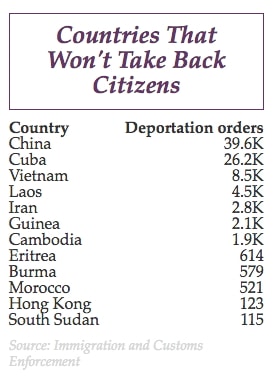100,000 in U.S. Ordered Deported, but Their Countries Won’t Take Them Back
Brendan Kirby, PoliZette, November 27, 2107
{snip}
The Trump administration announced in September it would impose sanctions on four small countries that have thwarted U.S. efforts to deport citizens from their nations.
Jessica Vaughan, director of policy studies at the Center for Immigration Studies, said the move in September signaled a new, aggressive policy toward “recalcitrant countries,” what the federal government calls nations that fail to cooperate — or outright refuse — to repatriate their citizens.
{snip}
Vaughan pointed to a June ruling by a federal judge in Michigan blocking the deportation of about 100 Iraqi citizens who argued they faced persecution if returned to their home country. Some of them came to the United States as children and committed crimes long ago but had been able to remain in the United States because Iraq would not take them back.
Immigration and Customs Enforcement (ICE) officers arrested them after Iraq agreed to take them as part of a deal to remove the country from Trump’s original list of countries covered by a temporary ban on travelers from terrorism-compromised countries.
{snip}
The visa sanctions imposed by the Trump administration ranged from denying Eritrean residents B visas for business or pleasure travel to the United States to denying such visas to employees of the Cambodian Ministry of Foreign Affairs with the rank of director general and above, and their families. For Sierra Leone, the B visa sanctions apply to employees of the Ministry of Foreign Affairs and immigration officials.
Meanwhile, sanctions imposed on Guinea targeted government officials and their immediate family members, and include B visas along with F, J and M visas for student and exchange programs.
{snip}
If the countries do not respond to the initial round of penalties, said Vaughan, the U.S. government needs to raise the stakes. {snip}
Even if the Trump administration succeeds in forcing changes in Guinea, Sierra Leone, Eritrea and Cambodia, it would barely scratch the surface of undeportable foreigners living in the United States.
{snip}
More than 5,700 citizens of the four targeted countries had final deportation orders, according to the most recent figures from ICE. For context, 97,589 people from a dozen recalcitrant countries were under orders to deport, although that is down sharply from October 2016, when a report released by then-Sen. Jeff Sessions (R-Ala.) showed that 242,772 people with deportation orders came from uncooperative or recalcitrant countries.
By far, the largest numbers of current undeportable immigrants are from China, with 39,552 — and Cuba, 36,204.
Many immigrants with deportation orders have committed crimes. Among Cambodian nationals, according to ICE, 1,412 of the 1,926 under deportation orders have criminal convictions.
{snip}
But Mehlman said the Trump administration should not shy away from pressing countries like China for concessions on the repatriation of deported citizens.
{snip}
For example, Vaughan said, the United States could make changes to an agreement the United States struck with Cuba during Bill Clinton’s administration to accept 20,000 Cubans a year into the United States. About 5,000 of that total comes from immigrants eligible for family-sponsored visas. But Vaughan said the rest come from a visa lottery run by the State Department specifically for Cubans in the 1990s. The United States is still processing applicants from among the 541,000 Cubans who sought to immigrate to the country in fiscal year 1998.
Rather than accepting new immigrants, Vaughan said, the United States could count undeportable Cubans already in the country against the total.
{snip}
















